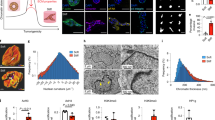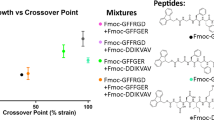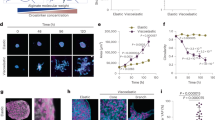Abstract
PLATING of individual cells in semi-solid media based on bacteriological agar is a common means of assaying the “transforming” activity of potential cancer-inducing agents1. Transformation is associated with an increased ability to form three dimensional colonies in agar: it often results from the treatment of mammalian cells with viruses2,3 or chemical carcinogens4. With other cells, large numbers have to be plated before even a few colonies appear. Moreover, many of the colony-forming cells turn out to be “mutants” or “spontaneous” transformants, not capable of indefinite propagation in agar medium5. Although the actual frequency with which such colonies appear may vary greatly (in the range 10−6 to 10−4), it is generally true that transformation results in much greater colony-forming ability relative to the parental cells.
This is a preview of subscription content, access via your institution
Access options
Subscribe to this journal
Receive 51 print issues and online access
$199.00 per year
only $3.90 per issue
Buy this article
- Purchase on Springer Link
- Instant access to full article PDF
Prices may be subject to local taxes which are calculated during checkout
Similar content being viewed by others
References
Macpherson, I., in Fundamental Techniques in Virology, 214 (Academic Press, New York, 1969).
Macpherson, I., and Montagnier, L., Virology, 23, 291 (1964).
Black, P. H., Virology, 28, 760 (1966).
Borenfreund, E., Krim, M., Sanders, F. K., Sternberg, S. S., and Bendich, A., Proc. US Nat. Acad. Sci., 56, 672 (1966).
Montagnier, L., Macpherson, I., and Jarrett, O., J. Nat. Cancer Inst., 36, 503 (1966).
Macpherson, I., and Stoker, M., Virology, 16, 147 (1962).
Stoker, M., and Macpherson, I., Nature, 203, 1355 (1964).
Montagnier, L., Vigier, P., Boue, U., and Boue, L., CR Acad. Sci., D, 265, 2161 (1967).
Montagnier, L., CR Acad. Sci., D, 267, 921 (1968).
Macpherson, I., J. Nat. Cancer Inst., 30, 795 (1963).
Sanders, F. K., and Burford, B. O., Nature, 201, 786 (1964).
Ham, R. G., Exp. Cell Res., 29, 515 (1963).
Dulbecco, R., and Vogt, M., J. Exp. Med., 99, 167 (1954).
Lippmann, M., in Epithelial-mesenchymal Interactions (edit. by Fleischmajer, R., and Billingham, R. E.), 208 (Williams and Wilkins, Baltimore, 1968).
Konigsberg, I. R., Science, 140, 1273 (1963).
Hauschka, S. D., and Konigsberg, I. R., Proc. US Nat. Acad. Sci., 55, 119 (1966).
Author information
Authors and Affiliations
Rights and permissions
About this article
Cite this article
SANDERS, F., SMITH, J. Effect of Collagen and Acid Polysaccharides on the Growth of BHK/21 Cells in Semi-solid Media. Nature 227, 513–515 (1970). https://doi.org/10.1038/227513a0
Received:
Issue Date:
DOI: https://doi.org/10.1038/227513a0
This article is cited by
-
Carboxymethyl benzylamide dextrans inhibit breast cell growth
In Vitro Cellular & Developmental Biology - Animal (1994)
-
Inhibition of growth factor binding and intracellular Ca2+ signalling by dextran sulfates of different sizes and degrees of sulfation
Cancer Chemotherapy and Pharmacology (1992)
-
An improved method for calculating colony forming ability in soft agar with special reference to malignancy
Experientia (1981)
-
The use of agarose in the determination of anchorage-independent growth
In Vitro (1979)
-
Growth limitation of BHK-21 cells and its relation to folate metabolism
In Vitro (1979)
Comments
By submitting a comment you agree to abide by our Terms and Community Guidelines. If you find something abusive or that does not comply with our terms or guidelines please flag it as inappropriate.



